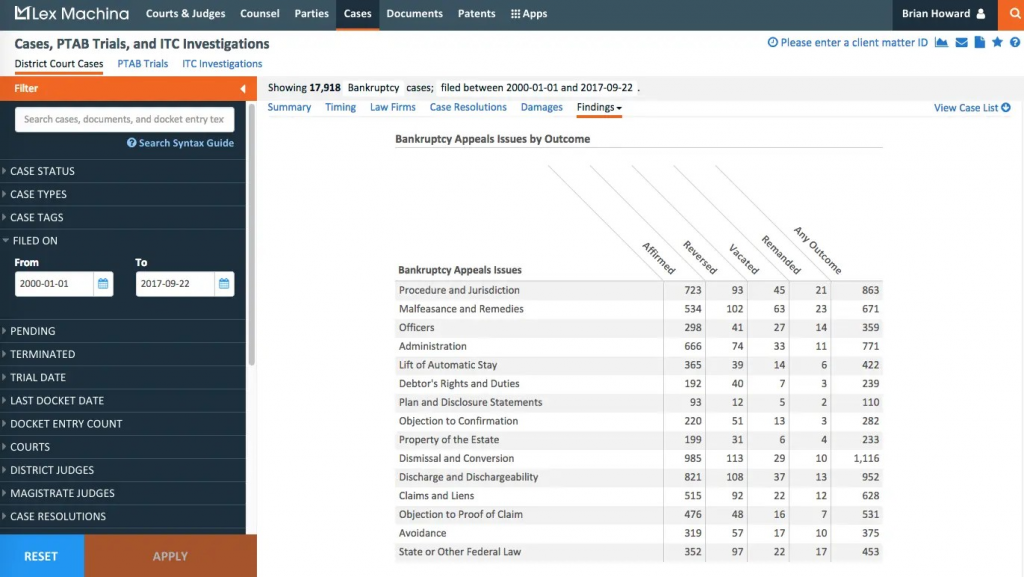Lex Machina is at the forefront of modern legal analytics, revolutionizing how legal professionals process and leverage vast datasets to build compelling cases. The legal industry is known for its complexity and the sheer volume of information lawyers must review to create effective case strategies.
Sorting through this data to find critical insights can be an arduous and time-consuming task. Lex Machina addresses this challenge by transforming dense legal data into actionable insights through the power of AI-driven analytics. By utilizing advanced algorithms and comprehensive legal datasets, Lex Machina enables legal professionals to make data-backed decisions, streamline research, and develop stronger strategies.
Legal professionals can leverage these insights to predict case outcomes, assess risks, and craft winning arguments. The platform’s AI-driven tools also support fast text summarization of legal documents, saving valuable time on manual research. This comprehensive approach to legal analytics empowers legal teams to reduce risk, increase efficiency, and strengthen their competitive edge in the courtroom.
Key Takeaways
- Lex Machina processes large amounts of legal data to generate clear, actionable insights.
- The platform’s database spans 27 million cases from 94 federal and 1,300 state courts.
- It uses AI to summarize case text, enabling legal teams to focus on core tasks instead of manual research.
- Users can analyze opposing counsel’s litigation patterns, judge tendencies, and law firm performance.
- By leveraging data-backed insights, legal teams can anticipate case outcomes and mitigate litigation risks.
The Role of Lex Machina in Legal Technology
Lex Machina stands out as a vital tool in the transformation of legal technology being rapidly evolved. By streamlining data analysis, it enables lawyers to access critical information instantly. The platform’s ability to convert complex legal datasets into clear, actionable insights makes it indispensable for individual practitioners and large law firms alike.
With access to over 27 million cases from federal and state courts, Lex Machina’s vast database empowers users with a wealth of legal knowledge. The platform’s unique ability to normalize approximately 134 million names provides users with deeper insight into litigation trends, offering an unparalleled advantage in strategic decision-making. This capability allows legal professionals to track patterns, predict outcomes, and refine case strategies with precision.
The tool’s advanced analytics enable firms to better understand judicial behavior, assess opposing counsel’s tactics, and gauge the strengths and weaknesses of specific case types. By transforming raw legal data into actionable insights, Lex Machina helps legal teams reduce research time, minimize risks, and strengthen case preparation. With its robust data-driven approach, Lex Machina has become an essential component of modern legal practice, driving smarter decisions and more favorable case outcomes.

Exploring Lex Machina’s Key Features
Comprehensive Legal Analytics
Lex Machina’s legal analytics feature combines artificial intelligence with deep legal expertise. This blend provides insights that help legal professionals predict outcomes, assess risks, and develop strong case strategies. The platform’s on-demand subscription model offers users instant access to a wealth of legal data, enabling them to analyze judge behaviors, opposing counsel tactics, and litigation trends.
From IP Litigation to Broader Case Coverage
Initially focused on intellectual property (IP) litigation, Lex Machina has expanded its reach to cover a wide range of legal cases. Following the launch of its “Litigation Footprint” in March 2024, the platform’s coverage now extends to over 27 million cases from 94 federal and 1,300 state courts. This evolution has allowed Lex Machina to offer data-driven insights across multiple areas of law, giving users a broader perspective on case trends.
Court and Judge Analysis
With Lex Machina, users can analyze the performance of judges in specific cases. Users can track the number of cases filed, termination times, and key case milestones, enabling them to tailor their legal strategies accordingly. This information allows legal teams to predict judge tendencies, prepare stronger arguments, and streamline case preparation.
In the Central District of California, the platform provides insight into judge-specific data on contracts cases.
Opposing Counsel and Party Analysis
Lex Machina enables users to assess opposing counsel’s experience and track record. Features such as “Client List Insight” provide details on a lawyer’s past clients, while the “Law Firms Report” highlights law firms’ litigation performance.
Users can identify firms like Greenberg Traurig, which secured 1,011 damage awards totaling over $1.7 billion in federal district court.
This data helps legal teams prepare for counterarguments and refine their negotiation strategies.
AI-Powered Summarization of Case Texts
One of the most time-saving features of Lex Machina is its AI-powered text summarization. This tool converts case complaints into easy-to-read summaries, detailing the nature of the case, the parties involved, and the remedies being sought.
This feature allows legal teams to save significant time on research and quickly extract key details from case documents.
In a case involving Guaranteed Rate, Inc. and Timothy Ray Harris Jr., the platform’s AI-generated summary revealed details about a breach of contract claim and a request for damages of at least $110,000.
How to Use Lex Machina
Using Lex Machina is simple, even for those new to legal analytics. Here’s a step-by-step guide on how to get started:
- Subscribe to Lex Machina through their website. Once you have an account, log in to access the platform.
- Use the search bar to enter keywords, case names, or legal issues. You can filter results by court, judge, time frame, or case type.
- View profiles of judges and opposing counsel to understand their behavior, tendencies, and ruling patterns. This insight can guide your legal strategy.
- Use Lex Machina’s analytics to study historical trends for specific case types. This allows you to predict possible outcomes and refine your approach.
- The platform’s AI-generated summaries quickly condense case details, saving hours of research time. Review key points, damages, and remedies at a glance.
- Export custom reports on case outcomes, trends, or opposing counsel insights to share with your legal team or clients.
- Use the data to strengthen case arguments, prepare for negotiations, and reduce risks in litigation.
With Lex Machina, you can make smarter decisions, reduce research time, and improve case outcomes.
Lex Machina’s Pricing
Lex Machina doesn’t offer a one-size-fits-all pricing plan. Instead, their pricing is customized to match the unique needs of your firm or legal team. Costs may vary depending on the size of your organization, the number of users, and the features you need access to.
To get exact pricing, you’ll need to contact Lex Machina directly through their official website. They typically provide a personalized quote after understanding your specific requirements. For those interested in exploring the platform, Lex Machina also offers demos so you can see how the platform works before making a decision.
This approach ensures that every user gets a plan tailored to their needs, whether you’re a solo practitioner or part of a large legal firm. If you’re curious about how Lex Machina can support your legal strategies, reaching out for a demo or consultation is a great first step.
Advantages of Lex Machina in Legal Technology
Smarter Decision Making
Lex Machina helps legal teams make better decisions by providing data on past case outcomes, judge behavior, and opposing party tactics. This information allows lawyers to predict rulings, identify strong arguments, and plan more effective strategies.
Instead of relying on assumptions, lawyers use real data to guide their decisions, resulting in better case outcomes and more confident client advisory.
Faster Case Research
Researching legal cases can be tedious and time-consuming, but Lex Machina changes that. Its AI-powered tools generate quick, clear summaries of case complaints, judge rulings, and party information.
Instead of manually reading through case files, lawyers can review important details in minutes. This means they spend less time on research and more time focusing on case strategy, ultimately improving productivity and efficiency.
Deeper Insights on Judges
Lex Machina gives legal teams insight into how specific judges tend to rule on certain types of cases. This information includes case timelines, ruling tendencies, and common case outcomes.
Lawyers can use these insights to tailor their arguments to a judge’s preferences, improving their chances of success in court. Knowing a judge’s patterns helps legal teams build stronger, more strategic case presentations.
Analysis of Opposing Counsel
With Lex Machina, lawyers can track the history and behavior of opposing counsel and parties. This analysis shows how opponents approach cases, revealing their strengths, weaknesses, and strategies. By knowing what to expect, lawyers can anticipate counterarguments and develop more effective negotiation tactics.
This competitive edge helps them prepare for litigation, strengthen their case, and increase the likelihood of favorable outcomes.
Predicting Case Outcomes
Lex Machina can forecast case outcomes based on data from past rulings, settlement trends, and party behavior. This predictive capability helps legal teams assess the risks and benefits of pursuing a case.
Knowing the possible outcomes allows lawyers to plan better strategies, negotiate settlements, or decide if a case is worth pursuing. Predictive insights increase confidence in decision-making and reduce unnecessary litigation risks.
Reducing Risks and Controlling Costs
Litigation is expensive, but Lex Machina helps law firms manage costs by identifying risks early. It uses case data to highlight potential issues with judges, opposing counsel, or legal strategies.
By identifying potential risks early, legal teams can avoid costly mistakes, settle cases more effectively, and reduce the financial burden of prolonged litigation. This leads to better cost control and more predictable legal expenses.
Custom Reports and Visual Dashboards
Lex Machina allows legal teams to create custom reports and dashboards that showcase key information, like judge performance, case trends, and party analysis.
These reports are easy to understand and visually appealing, making it simple to share insights with clients and stakeholders. Clear, visual reports help clients see the bigger picture and increase transparency, ultimately improving client trust and decision-making.
Industry-Wide Insights
Lex Machina doesn’t just track cases in specific practice areas; it offers data across industries. Whether it’s healthcare, tech, or financial services, law firms can see how industry-related cases have played out over time.
This broad view of industry trends helps firms create stronger case strategies and stay ahead of legal changes affecting their clients. For firms dealing with rapidly changing industries, these insights are invaluable.
Builds Client Confidence
Clients want law firms that can predict case outcomes and offer clear guidance. Lex Machina makes this possible by providing accurate forecasts of case timelines, settlement potential, and judge rulings.
When clients see that their legal team is relying on hard data—not just guesswork—they’re more likely to trust their advice. This leads to stronger client relationships and better client satisfaction.
Saves Time on Research
Manual legal research can take hours, but Lex Machina’s AI-driven tools automate these tasks. It quickly summarizes key case details, including claims, damages, and remedies.
Instead of reading through endless case files, lawyers get the highlights instantly. This automation allows legal teams to focus on strategy, preparation, and client engagement, ultimately saving time and boosting efficiency.
These advantages make Lex Machina a valuable tool for law firms and legal teams looking to improve strategy, reduce costs, and enhance client outcomes.
Conclusion
With the evolvement of legal technology streamlining data analysis has enabled lawyers to access critical information instantly. The platform’s ability to convert complex legal datasets into clear, actionable insights makes it indispensable for individual practitioners and large law firms alike.
Lex Machina Analytics revolutionizes legal research and strategy development by providing actionable insights into judges, opposing counsel, and case trends. Its AI-powered tools generate quick summaries, significantly reducing research time. The platform’s predictive analytics enable smarter, data-driven decisions, while its litigation trend analysis helps legal teams refine case strategies.
By minimizing risks and enhancing decision-making, Lex Machina empowers legal professionals to stay ahead in a competitive industry. For firms and practitioners seeking an edge, Lex Machina’s comprehensive analytics offer the clarity and precision needed to secure more favorable case outcomes.
Frequently Asked Questions
What is Lex Machina Analytics?
Lex Machina Analytics is a legal technology platform that converts complex case data into clear insights, enabling legal teams to analyze case outcomes, trends, and strategies.
How can legal professionals use Lex Machina?
Lawyers can use Lex Machina to identify winning arguments, track judge behaviors, and analyze opposing counsel’s strategies. These insights are crucial for building more effective case strategies.
Does Lex Machina provide real-time data updates?
Yes, Lex Machina continuously updates its case database to provide users with the latest insights on court rulings and legal trends.
Can Lex Machina be integrated into existing systems?
Yes, Lex Machina’s platform can be easily integrated into existing workflows, enhancing research efficiency without requiring major process changes.



